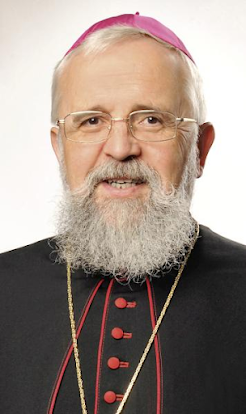German Bishop calls opponents of Synodality diabolical
"Like the devil responds to holy water"
The Vatican also puts a damper on reform ideas for the General Assembly of Bishops. Magdeburg's bishop finds Roman fears of a Synodal Council unfounded. He would like his confreres to show more understanding for the diaspora.
DOMRADIO.DE: What does it mean to you that the Bishops' Conference is visiting the East German diaspora for the third time?
Gerhard Feige (Bishop of Magdeburg): It is exciting. I am happy about it. It is a highlight, in a way. But I also don't know if many bishops outside this conference are now aware of the situation or even know about the situation. And that's what I would actually like to see, that more experiences would be made with our situation.
(Cathcon: The conference is taking place in the former East Germany; German Catholics where they are in a minority are called members of the diaspora.)
DOMRADIO.DE: What would you like to pass on to your confreres from the diaspora?
Bishop Gerhard Feige
"My favourite thing would be a kind of exposure programme."
Feige: What I would like most is a kind of exposure programme. To just leave the bishops out, not to invite them to a special thing. And then they can experience what it is like to organise something in such a situation with very few means, very few possibilities. Simply prepare a Mass yourself, pick out the songs and sing them. That could also be fun.
DOMRADIO.DE: Do you find that your diaspora situation is heard more today than in the past?
Feige: Yes, there is a lot of talk about diaspora. But whether one internalises what is connected with it, that is my problem and the challenge. On the other hand, we don't live in a reservation, we live in Germany and we also participate in all other developments, both in politics and society, as well as in the Church. But we do have special features, and that is our small number. That is our wide territory. The diocese of Magdeburg is the fourth largest in terms of territory and only 76,000 Catholics live there. That is half as many as the diocese of Dresden-Meissen has. And those are already enormous challenges.
DOMRADIO.DE: What does that mean in concrete terms? What do you have to do differently than your confreres in Catholic areas?
Feige: Well, we don't have such large apparatuses, for example the ordinariates or vicariates general. I once heard that Munich has 1,000 employees, we have 40. And in between there are other dioceses, also with several hundreds. But we have to guarantee the same standards as the other dioceses. And that is an enormous challenge.
Or our financial possibilities are very limited. And that will become even more difficult in the coming years. To live with that and to shape the Church with so few, that is already a great challenge. But I have to say that these are only the framework conditions that do not make it easy. On the other hand, I am experiencing many positive things.
I have a mantra that I carry before me for our situation. Namely: How do we see ourselves as Catholic Christians, as a creative minority in an ecumenical spirit and in co-operation with other partners in society? And with that, I think, we can also live and realise the Church. That is perhaps an experience that some other dioceses are not yet making in this radical way.
DOMRADIO.DE: Does that make it easier for you to tackle reforms like the Synodal Path? There is perhaps less fear of contact with topics such as ecumenism or dealing with the state.
Feige: Well, we don't really have any more fear of contact, but our situation is still different from the West German situation. That is to say, many of the problems that are presented so urgently and also very pointedly are not yet discussed so vigorously here. But the problems are there too. Therefore, reforms are absolutely necessary; this concern is also burning in our prayers. And there are great expectations for the Synodal Path and I hope that we will make progress.
DOMRADIO.DE: In his greeting to the Bishops' Conference, Nuncio Eterović once again called for unity with Rome. On behalf of the Vatican, he rejected the idea of Synodal Councils even at diocesan level. How did that go down with you?
Feige: I have the impression that some people fear a Synodal Council like the devil fears holy water. But it is not yet concrete and so I would say that the deliberations should continue. At least that is how I experience it in our diocese.
What is the idea of such a Synodal Council? What competences does it have? What legal basis does it have? What is the relationship of the Bishop to this council? All this still has to be explored. And that is why I think that we should continue to consider how the trusting co-operation that we already have can be further developed and made more sustainable.










.jpeg)

Comments